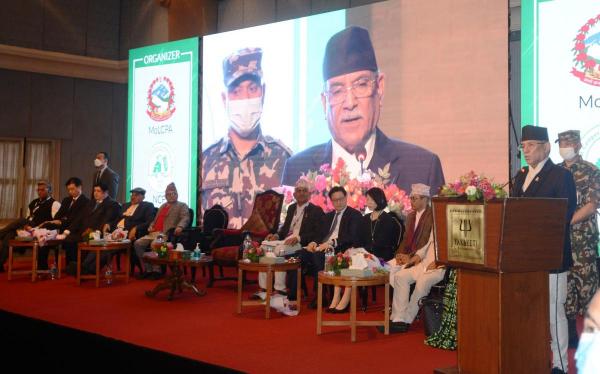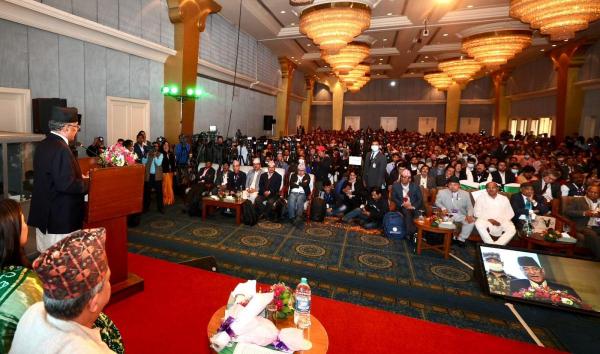
The third Nepal Cooperative Congress was held from 6 to 8 April in Kathmandu with the theme “Self-Regulation and Governance for Cooperatives Sustainability.” It was jointly organized by the National Cooperative Federation of Nepal (NCF) and the Ministry of Land Management, Cooperatives and Poverty Alleviation (MoLCPA). The Congress is a common platform for all levels of cooperatives, stakeholders, and well-wishers to discuss and commit to the sustainable development of the cooperative movement in Nepal.
Cooperatives play an important part in improving the social, economic, cultural, environmental, and political advancement of Nepal. The Cooperative Act of 1992 provided the basis for the growth of cooperatives and was further accelerated by the progressive Cooperative Act 2017. Currently, there are over 30,000 cooperatives in Nepal, comprising 7.3 million individual members, with 56% women participation. These cooperatives have accumulated over Rs. 94.22 billion as share capital and Rs. 478 billion as savings and have disbursed over Rs. 427 billion as loans to their members.
Cooperatives in Nepal have contributed to social-economic integration, capital formation, and leadership development, irrespective of caste and gender. They promote gender equality, social inclusion, and entrepreneurship development at the community level, contribute to poverty reduction, and take forward the 2030 global agenda for sustainable development (SDGs). The Government of Nepal Voluntary National Review (VNR) Report to the United Nations High-Level Political Forum (HLPF) on SDGs in 2017 and 2020, highlighted the contribution of cooperatives in achieving SDGs.
Despite their significant contributions, cooperatives in Nepal are still lagging behind from an institutional development viewpoint, and their contributions are not measured in the national accounts. There are several bottlenecks that need to be addressed, such as dormant members, inadequately trained human resources, lack of strategic direction, and weak risk management. The 2022 liquidity crunch in the financial system has hampered the service delivery mechanism of cooperatives. The monitoring and supervision by regulatory bodies are not very effective.
The Congress discussed important issues relating to the democratic governance of cooperatives, deepening the cooperative identity, strengthening self-regulation, enhancing digital adoption, and developing partnerships. The Nepal Cooperative Movement Vision 2030 was presented at the Congress. The Congress was inaugurated by the Rt. Honourable Prime Minister, Pushpa Kamal Dahal and attended by Former Prime Minister Honourable K.P. Oli, Governor of Nepal Rastra Bank, Mr. Maha Prasad Adhikari, and current and former ministers. The ICA-AP Regional Board led by President Dr. Chandrapal Singh Yadav also attended the Congress.

The Congress called for tangible strategic direction and commitment, massive awareness, interaction, and critical discussion with different levels of government to push for a self-regulation system and enforce governance models. It reiterated the need to create an enabling environment for cooperatives by revisiting the ethos of the cooperative sector, eliminating malpractices, realizing cooperative philosophy, values, principles, and identity, and implementing external and internal policies, rules, and standards. It stressed on the contribution of cooperatives to GDP and the financial sector to be increased, and their contributions to be mapped through disaggregated data adjoining national accounts. The Congress ended with the adoption of the Kathmandu Declaration – 2023.
Kathmandu Declaration-2023
We, cooperators and stakeholder representatives assembled at the "Third National Cooperative Congress" in Kathmandu from 6-8 April 2023, with the theme “Self-Regulation and Governance for Coops Sustainability” jointly organized by the National Cooperative Federation of Nepal (NCF) and Ministry of Land Management, Cooperatives and Poverty Alleviation (MoLCPA) to promote sustainable and decent cooperative movement through Coop Vision 2030 "Prosperous Cooperatives: Satisfied Members", declare the following:
We undertake to promote qualitative cooperative movement through member centric business by screening cooperative identity and maintaining self-regulation and governance derived from cooperative values, principles and beliefs;
- We commence to accomplish a nationwide awareness campaign to protect members’ deposits and leverage cooperative trust;
- We commit ourselves to take necessary initiatives for the implementation of promotional provisions envisioned by laws for coops sustainability;
- We ensure to do collective lobbying and advocacy with all three level governments to rule out the problem of liquidity shortage in cooperatives existed from nationwide economic strain;
- We recommit to gearing up cooperative "Amalgamation as a Movement" for qualitative service delivery by apprehending innovative technologies and increasing the health and competitive capacity of cooperatives;
- We strongly reaffirm to take collective initiatives for the necessary amendment and full-fledged implementation of cooperatives and interrelated acts as required; investing cooperatives’ capital on value chain development adopting high-technology, and channelizing funds of governments through National Cooperative Bank Ltd;
- We recommit to contributing to the Sustainable Development Goals by developing and implementing internal procedures in cooperatives for inclusion referencing women and youth for their active participation and capacity enhancement, access to finance, and involvement in the decision-making level;
- We commit to producing and retaining competent human resources through formal cooperative education and increasing organizational work efficiency in the changed context of the working environment;
- We ensure to increase investment in agriculture, tourism, hydropower, health, education and transport industry and promote environment-friendly agro production, substituting imports and promoting exports, and generate employment opportunities through the Public, Private and Cooperative Partnership (PPCP) model;
- We endeavour to promote a cooperative brand with large and specialized productions; advancing the agriculture and livestock sector, establishing large farms, and developing the product’s value chain and supply chain via "Specialized Cooperative Federations";
- We commit to developing a strong mechanism for measuring cooperative sectors’ contribution to National Economy via cooperative disaggregated data and increasing investment in cooperatives' study and research.



